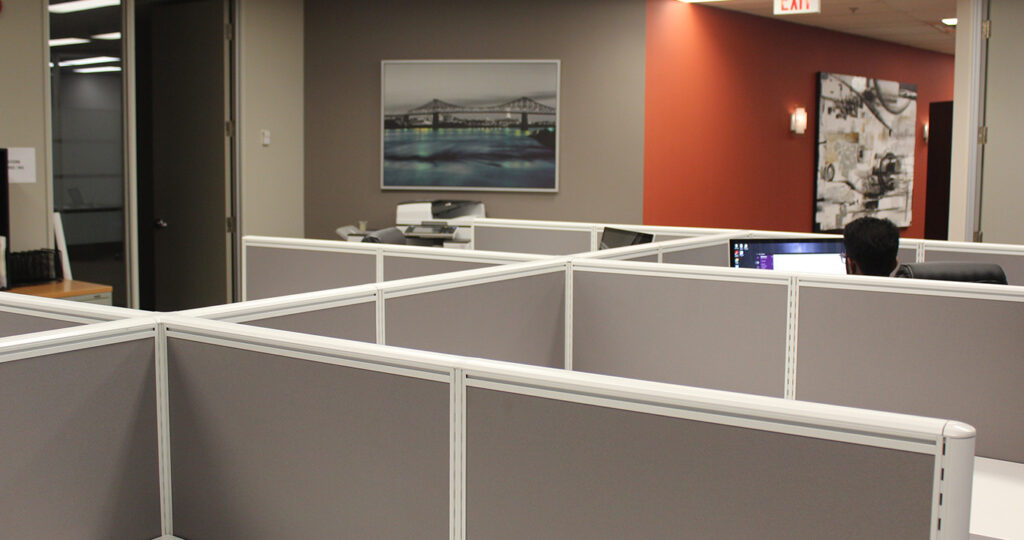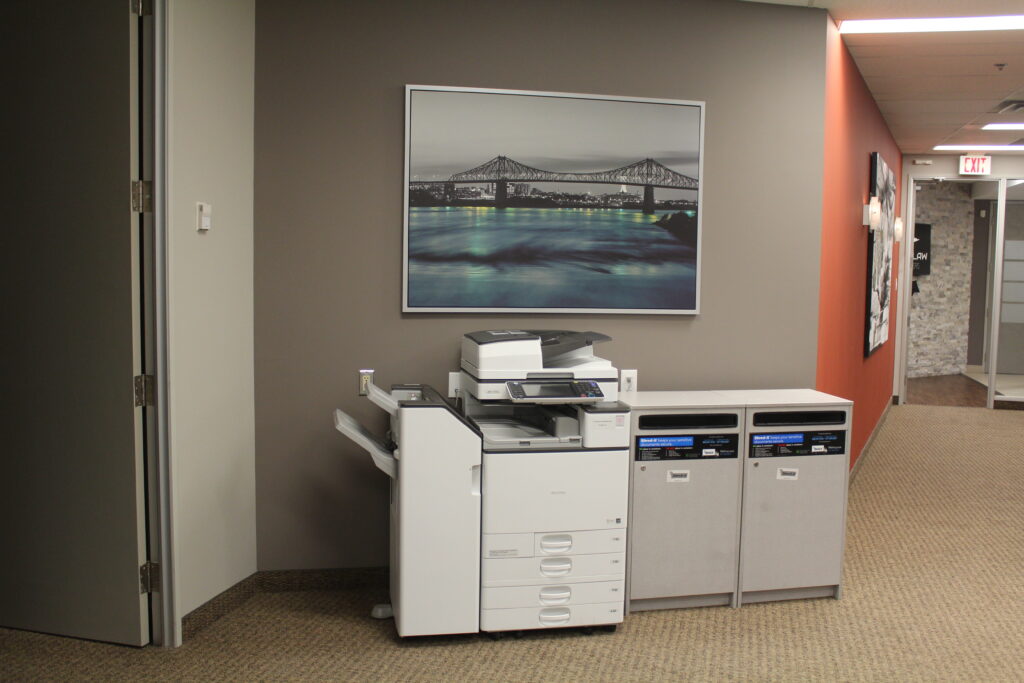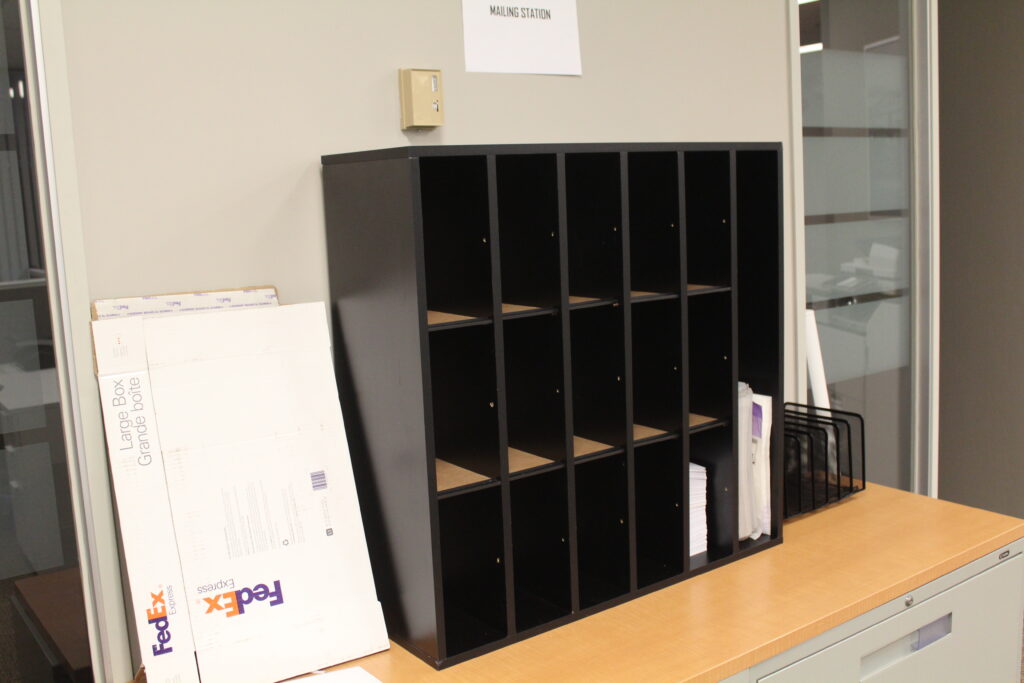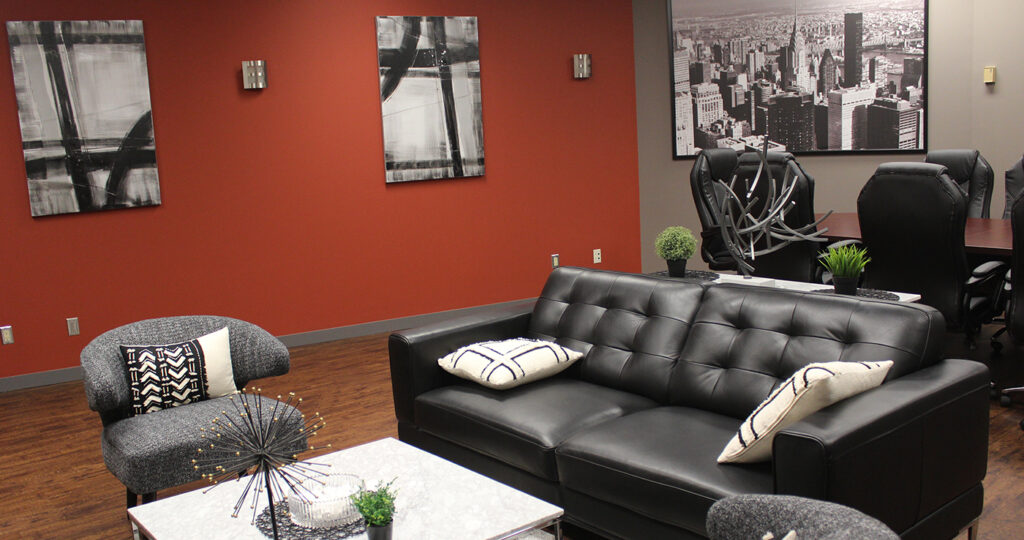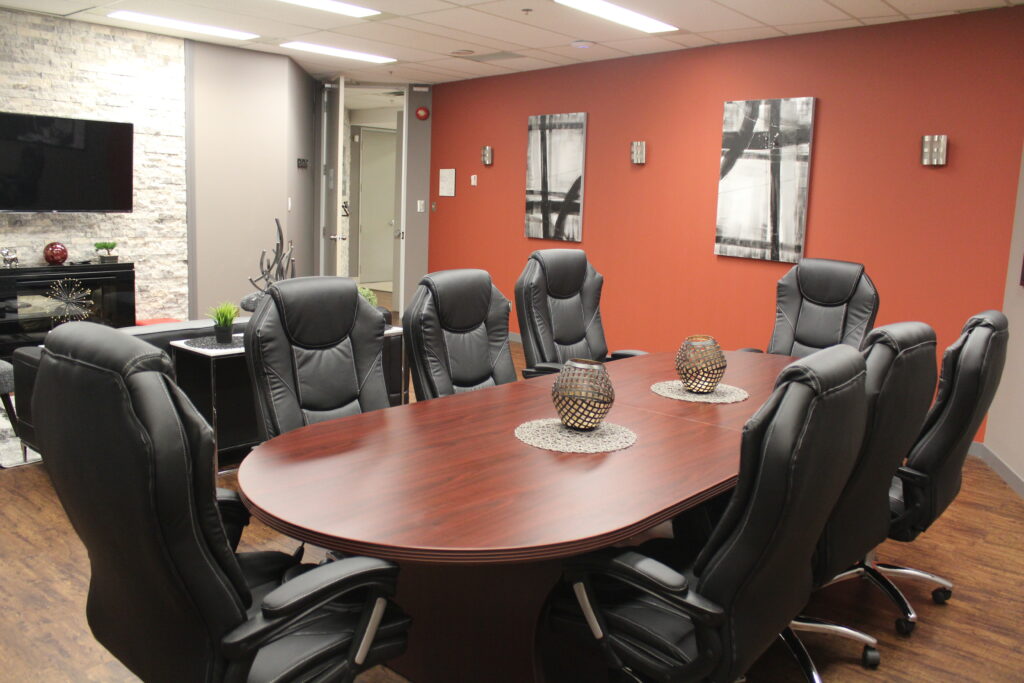CLERK STATIONS
Shared Office Spaces for Lawyers: Legal Considerations & Lease Essentials
Shared office spaces offer flexibility and cost-efficiency—making them an attractive option for solo lawyers and small firms. But before you sign that lease, here are a few legal essentials to keep in mind:
✅ Confidentiality: Ensure the space layout and policies support client privacy. Look for soundproof meeting rooms and secure storage options.
📄 Lease Terms: Review for hidden fees, clear terms on shared resources, and termination clauses. Know what’s included—Wi-Fi, receptionist services, kitchen access?
⚖️ Professionalism: Consider whether the environment maintains the professional image expected in the legal field.
🔐 Security: Confirm secure entry systems and protocols for after-hours access.
Shared spaces can be a smart solution—but only if they align with your ethical and practical needs as a lawyer.
How Coworking Spaces Empower Lawyers Through Collaboration & Innovation
In recent years, coworking spaces have become a revolutionary force in the business world, offering an alternative to traditional office environments. This shift is not only affecting tech startups and creatives but also transforming the legal profession. Lawyers, like professionals in any other industry, are increasingly turning to coworking spaces to foster collaboration and ignite innovation.
1. Networking Opportunities: A Collaborative Environment Coworking spaces are a hub for professionals from a variety of industries. For lawyers, this means more than just having access to a desk and high-speed internet. These spaces create a unique environment where attorneys can network with other legal professionals, entrepreneurs, and business owners. This diverse ecosystem allows lawyers to collaborate on ideas, share expertise, and potentially discover new avenues for business growth. By connecting with people from various fields, lawyers can stay updated on industry trends, gain referrals, and strengthen their professional network.
2. Flexibility to Innovate Traditionally, law firms operated in rigid office setups, with long hours spent in isolated spaces. Coworking environments, however, offer lawyers the flexibility to break free from these constraints. They provide flexible memberships, allowing lawyers to choose the amount of space and resources they need, whether it’s a private office for confidential client meetings or a hot desk to collaborate on a project. This flexibility encourages lawyers to think outside the box and explore innovative ways to serve clients. By eliminating the overhead of maintaining a traditional office, lawyers can reinvest those savings into technology, marketing, or business development.
3. Access to Cutting-Edge Technology Modern coworking spaces often come equipped with advanced technology—high-speed internet, state-of-the-art printing, and video conferencing facilities—that may otherwise be too expensive for solo practitioners or small firms. With these resources at their fingertips, lawyers can offer better service to clients, hold virtual meetings, and stay competitive in an ever-changing legal landscape.
4. Enhanced Work-Life Balance Working in a coworking space also promotes a healthier work-life balance. The dynamic and flexible nature of these spaces allows lawyers to avoid the burnout often associated with traditional office settings. Many coworking spaces offer amenities like wellness programs, coffee lounges, and social events, which help create a more balanced and productive workday. This can lead to a more fulfilling career and greater job satisfaction, which ultimately benefits both lawyers and their clients.
Conclusion Coworking spaces are reshaping the way lawyers work, enabling them to collaborate, innovate, and grow their practices in ways that were once unimaginable. With a focus on networking, flexibility, technology, and work-life balance, these spaces empower lawyers to stay ahead of the curve and deliver exceptional service to their clients.
The Future of Law Offices in Ontario: Embracing Hybrid, Remote & Shared Spaces.
The landscape of law offices in Ontario is undergoing a transformation. With the growing demand for flexibility and the impact of technology, law firms are embracing hybrid, remote, and shared spaces like never before.
Hybrid models allow legal professionals to work from home or the office, offering better work-life balance while maintaining productivity. Remote work enables lawyers to serve clients across the province without being tied to a physical location, expanding their reach and creating opportunities for more diverse practices.
Shared office spaces are also gaining popularity. They provide cost-effective solutions and foster collaboration among legal professionals, creating a sense of community, even if working in different firms.
As Ontario’s legal industry continues to adapt, embracing these modern workspaces will not only drive efficiency but also redefine what a law office can be in the future.
#FutureOfWork #LawOffices #OntarioLaw #HybridWork #RemoteWork #SharedSpaces #LegalInnovation #LawFirmEvolution
The Top Soft Skills Every Lawyer and Law Clerk Should Develop
In the fast-paced and high-pressure world of law, technical knowledge and legal expertise are undoubtedly essential. However, equally important are the soft skills that help lawyers and law clerks navigate complex client relationships, collaborate with colleagues, and provide excellent service. Whether you’re just starting your legal career or looking to improve your existing skillset, focusing on these essential soft skills can set you apart and elevate your professional effectiveness.
Here are the top soft skills every lawyer and law clerk should develop:
1. Communication Skills
Clear and effective communication is at the core of legal practice. Whether you’re drafting legal documents, representing a client in court, or advising colleagues, your ability to articulate complex ideas simply and persuasively is crucial. This includes both verbal and written communication. Lawyers and law clerks need to be able to communicate with clients, judges, juries, and opposing counsel in a way that fosters trust, clarity, and understanding.
Pro Tip: Practice concise and jargon-free communication. Often, simplifying complex legal terms can make a significant difference in how well your message is received.
2. Emotional Intelligence (EQ)
In the legal field, emotional intelligence is vital. EQ involves recognizing and managing your emotions and understanding the emotions of others. High emotional intelligence allows lawyers and law clerks to maintain professionalism in stressful situations, manage client anxieties, and respond to emotional cues during negotiations or hearings.
Pro Tip: Develop active listening skills, and be empathetic to clients’ needs and concerns. This fosters stronger relationships and improves client satisfaction.
3. Problem-Solving and Critical Thinking
Lawyers are, at their core, problem-solvers. Whether you’re drafting a contract or strategizing a legal defense, the ability to think critically and solve problems efficiently is indispensable. Law clerks, too, must possess this skill, as they often need to anticipate issues and offer creative solutions to support their team.
Pro Tip: Work on honing your analytical thinking. Practice breaking down complex problems into smaller, more manageable pieces and consider all possible outcomes before making decisions.
4. Time Management
The legal field is notoriously demanding, with tight deadlines, long hours, and a heavy workload. Effective time management is crucial to staying organized and ensuring that all responsibilities are handled promptly. A lawyer or law clerk who can prioritize tasks, delegate when necessary, and maintain a work-life balance will be more successful in the long run.
Pro Tip: Use tools like calendars, project management software, or even simple to-do lists to keep track of your responsibilities and deadlines.
5. Teamwork and Collaboration
While lawyers are often seen as lone agents in courtrooms, the truth is that teamwork plays a significant role in legal practice. Collaborating with colleagues, law clerks, and other professionals (such as paralegals or external experts) can make a significant difference in a case’s success. Being able to work effectively with others, share insights, and respect diverse viewpoints strengthens any legal team.
Pro Tip: Be open to feedback from your team and offer support when needed. Collaboration fosters better outcomes and a positive work environment.
6. Adaptability and Resilience
The legal profession is constantly evolving, with changes in laws, regulations, and client needs. Being able to adapt to new challenges and bounce back from setbacks is an essential trait. Resilience helps lawyers and law clerks to maintain their focus, overcome obstacles, and continue performing under pressure.
Pro Tip: Build a growth mindset by viewing challenges as opportunities to learn and improve. This will help you stay agile in the face of change.
7. Networking and Relationship-Building
Networking is a key skill in the legal profession. Whether you’re building relationships with clients, colleagues, or industry professionals, networking helps you expand your influence and create opportunities. Law clerks also benefit from building strong professional connections that can aid in career development and future opportunities.
Pro Tip: Attend legal conferences, join online forums, and maintain an active LinkedIn profile. Always seek to nurture and grow your professional relationships.
8. Attention to Detail
In legal work, even the smallest detail can make or break a case. Whether you’re reviewing contracts, evidence, or case law, attention to detail is a skill that can’t be overlooked. Lawyers and law clerks need to be able to spot potential issues, errors, or inconsistencies that others might miss.
Pro Tip: Develop strategies for reviewing documents carefully and triple-check your work. The more you practice, the more natural attention to detail will become.
In conclusion, while technical skills form the backbone of legal work, soft skills are equally essential for long-term success. Lawyers and law clerks who develop strong communication, emotional intelligence, problem-solving, and teamwork skills will be better equipped to handle the challenges of the profession, build meaningful client relationships, and thrive in their careers.
What soft skills do you think are most important in your legal career? Share your thoughts in the comments below!
The Importance of Secure Messaging Apps for Lawyer-Client Communication.
In the legal profession, confidentiality is paramount. Lawyers handle sensitive client information daily, making secure communication essential. With cyber threats on the rise, traditional messaging platforms like email and SMS may not provide the level of security required to protect privileged conversations. That’s where secure messaging apps come in.
Why Secure Messaging Matters
Standard messaging services lack end-to-end encryption, leaving messages vulnerable to interception. Secure messaging apps offer encryption, data protection, and features like self-destructing messages to enhance privacy. This ensures that attorney-client communications remain confidential and compliant with ethical and legal obligations.
Top Secure Messaging Apps for Lawyers
- Signal – Open-source, end-to-end encrypted, and widely trusted for its strong security features.
- WhatsApp (with Caution) – End-to-end encrypted, but data-sharing concerns with its parent company may be a drawback.
- Wire – Provides enterprise-level security with encrypted messaging and secure file sharing.
- Threema – A privacy-focused app that doesn’t require a phone number for registration.
- Element (Matrix Protocol) – A decentralized option offering strong encryption and compliance features.
Best Practices for Lawyers Using Messaging Apps
- Use only encrypted platforms for sharing legal documents and sensitive information.
- Enable disappearing messages to reduce the risk of data leaks.
- Verify client identities before exchanging confidential information.
- Stay updated on compliance and security features of your chosen platform.
Secure messaging isn’t just a convenience—it’s a necessity in protecting client confidentiality. By choosing the right app and following best practices, lawyers can ensure their communications remain private and secure.
Privacy and Confidentiality: Tips for Lawyers Working in Coworking Spaces
In today’s fast-paced, flexible work environment, many professionals, including lawyers, are opting for coworking spaces to enhance their productivity, collaborate with peers, and embrace a more dynamic work culture. However, for lawyers, maintaining client confidentiality and privacy is paramount, especially in a shared workspace. With sensitive information and privileged communications at stake, it’s critical to be cautious and strategic about how to navigate these environments.
Here are some essential tips for lawyers working in coworking spaces to ensure privacy and confidentiality remain uncompromised:
1. Choose a Coworking Space with Security Features
Not all coworking spaces are created equal when it comes to security. Before committing, assess the space’s security protocols:
- Physical Security: Ensure the space has controlled access, such as keycards or biometrics, to restrict entry to unauthorized individuals.
- Data Security: Verify the space offers secure Wi-Fi networks, encrypted data transfer, and locked storage options for sensitive documents.
2. Use Private Meeting Rooms for Sensitive Discussions
While open seating areas and shared lounges can be conducive to creativity and networking, they are not the best choice for confidential client discussions. Opt for private meeting rooms or phone booths, and always check that the room is fully enclosed with no audio leakage. Many coworking spaces provide these as bookable options to maintain privacy.
3. Limit Shared Devices and Public Computers
Avoid using public computers or shared devices for tasks involving confidential information. If you need to access confidential documents, use your own encrypted devices and VPN (Virtual Private Network) to safeguard data. Additionally, always ensure that you log out of any accounts on shared devices.
4. Secure Client Files and Documents
For lawyers, keeping physical and digital client files secure is crucial. When working in coworking spaces:
- Use locked filing cabinets for physical documents.
- Store sensitive digital files in encrypted cloud services and set up strong passwords.
- Consider using a shredder or secure disposal bins to dispose of documents you no longer need.
5. Be Mindful of What You Share in Public Spaces
Coworking spaces foster a collaborative culture, but this can sometimes blur the lines of professionalism. Avoid discussing sensitive or confidential matters in common areas, even if you believe no one is listening. Conversations about client matters should remain private to protect your clients’ interests.
6. Implement Non-Disclosure Agreements (NDAs) When Necessary
If you’re collaborating with others in the coworking space on legal matters, ensure you establish clear confidentiality agreements or NDAs before sharing sensitive information. This will help legally protect your clients’ information and set expectations regarding privacy.
7. Practice Safe Remote Working
Coworking spaces can often be a haven for digital nomads and remote workers, which can lead to vulnerabilities. Be cautious when working remotely from coworking spaces:
- Always use a VPN to mask your online activity.
- Ensure your device’s software is up-to-date and has anti-virus protections.
- Turn off location tracking and avoid connecting to unsecured networks.
8. Educate Your Team and Clients
If you’re working with a team or clients in a coworking space, it’s important to communicate your confidentiality practices clearly. Ensure your team understands the importance of safeguarding confidential information. Similarly, reassure your clients that their privacy is being protected, which may help build trust in your services.
Conclusion
Coworking spaces can offer valuable opportunities for lawyers to network, collaborate, and increase their productivity. However, maintaining the highest standards of privacy and confidentiality requires careful planning and attention to detail. By following these tips, lawyers can thrive in coworking environments while ensuring they meet their ethical and legal responsibilities to their clients.
Remember, confidentiality is a cornerstone of the legal profession, and no matter where you work, it’s essential to protect the integrity of your practice and the trust of your clients.
Top 5 Factors Canadian Lawyers Should Consider Before Renting a Coworking Space
The legal profession demands a balance between privacy, professionalism, and practicality. For Canadian lawyers exploring coworking spaces, selecting the right environment is critical. Here are the top five factors to consider:
1. Privacy and Confidentiality
Lawyers handle sensitive client information, so the coworking space must offer private offices or meeting rooms where confidentiality is guaranteed. Look for spaces with soundproofing and secure document storage.
2. Professional Image
First impressions matter. The coworking space should exude professionalism, with elegant interiors, reliable tech support, and a welcoming reception. A polished setting instills confidence in your clients.
3. Accessibility and Location
Choose a centrally located coworking space that’s easy for both you and your clients to access. Proximity to courthouses, government offices, and public transit can save valuable time and enhance convenience.
4. Amenities and Resources
Ensure the space offers amenities that support your daily operations, such as high-speed internet, printing services, and equipped boardrooms. Bonus points for on-site parking, cafes, or fitness centers that add to your workday convenience.
5. Flexibility and Cost-Effectiveness
Consider a space with flexible leasing terms, as your practice’s needs may evolve. Ensure the pricing model aligns with your budget without compromising essential services.
In Conclusion
Choosing the right coworking space can enhance your practice by offering a blend of professionalism, functionality, and convenience. Take the time to assess your priorities and find a space tailored to your needs as a Canadian lawyer.
The Future of Law Offices in Ontario: Hybrid, Remote, and Shared Spaces
The legal profession in Ontario is undergoing a profound transformation, driven by technological advancements, changing client expectations, and the evolving work culture. As we look ahead, law offices are no longer defined solely by their physical spaces. Hybrid models, remote work, and shared office environments are becoming increasingly popular options for law firms and professionals. Here’s a look at the future of law offices in Ontario.
1. The Rise of Hybrid Work Models
The hybrid work model—combining in-office and remote work—has gained significant traction in Ontario’s legal sector. Law firms are realizing the potential of this flexible approach, allowing lawyers and support staff to balance in-person collaboration with the convenience of working from home.
For many law professionals, hybrid work offers increased productivity, better work-life balance, and the ability to tap into a broader talent pool. This shift also reflects client preferences for streamlined communication and services that are accessible no matter where their lawyer is based. Technology tools such as cloud-based legal management platforms and secure video conferencing have made it easier to work seamlessly across different environments.
2. Remote Work: Efficiency with Flexibility
Remote work is no longer just a temporary solution; it is becoming a long-term fixture in the legal landscape. With the ability to conduct client meetings, research, and file management remotely, law firms are finding that remote work enhances efficiency and reduces overhead costs associated with maintaining large office spaces.
Ontario’s law professionals are increasingly adopting flexible work arrangements that allow them to manage their practice from virtually anywhere. Whether working from home, a coffee shop, or a co-working space, remote work offers a level of autonomy that fosters a more dynamic and productive workforce.
3. Shared Office Spaces: The Flexible Solution
Shared office spaces, also known as coworking spaces, are making a strong impact in Ontario’s legal community. These spaces offer flexibility, affordability, and an environment conducive to collaboration. For small law firms or solo practitioners, shared spaces provide access to high-quality office amenities—such as meeting rooms, high-speed internet, and administrative support—without the burden of long-term leases or the responsibility of maintaining an office.
Moreover, shared spaces offer a sense of community and networking opportunities, with professionals from various industries coming together. This can lead to valuable referrals and collaborations that benefit both clients and legal professionals.
4. Client-Centric Approaches in Law Office Design
As the legal sector embraces hybrid, remote, and shared spaces, the focus is shifting to client-centric approaches in office design. In-person consultations may become less frequent, but when clients do visit, law offices need to provide a welcoming, efficient, and professional environment.
Innovative law firms are reimagining their office layouts to accommodate the needs of both lawyers and clients. Some are adopting tech-savvy spaces equipped with virtual consultation rooms, while others are designing more informal, collaborative spaces that foster open communication and trust. In an age where clients expect more than just legal advice, the physical space is becoming a reflection of a firm’s commitment to modern service delivery.
5. Challenges and Opportunities Ahead
While the shift toward hybrid, remote, and shared spaces offers numerous benefits, it also presents challenges. Law firms must prioritize data security and confidentiality when working remotely or in shared spaces. Ensuring that client information remains protected in a digital-first world is a top priority for firms looking to maintain client trust.
Additionally, maintaining firm culture and team cohesion can be challenging when some employees are working remotely or in different locations. Firms will need to invest in technology to bridge the gap, create opportunities for virtual team-building, and ensure that collaboration remains effective.
Conclusion
The future of law offices in Ontario is undoubtedly evolving, with hybrid, remote, and shared spaces at the forefront of this transformation. Law firms are embracing flexibility and adapting to the needs of both clients and legal professionals. As the legal sector continues to innovate, it’s clear that a more dynamic, accessible, and client-focused approach to law office design and operations is on the horizon.
Whether working remotely from a home office or collaborating in a shared space, Ontario’s legal professionals are setting the stage for the future of the profession—one that is agile, efficient, and responsive to the needs of a rapidly changing world.
The Best Virtual Office For You
Working from the comforts of your home is definitely viable for legal professionals as it offers economic flexibility due to varied reasons. There is no commute, you get to stay in your pajamas, customize your environment, and are able to create a flexible schedule for yourself. One important shortcoming though, is the lack of a professional office space to meet clients, a registered business/corporate address, and space for storing away documents and/or items that are not needed immediately. Let’s face it, a home is a home and a workplace is a workplace. There is a certain limit to conducting business from your home. You will probably function optimally if you complete work assignments in designed workspaces, which have the resources to help you succeed in your area of legal practice.
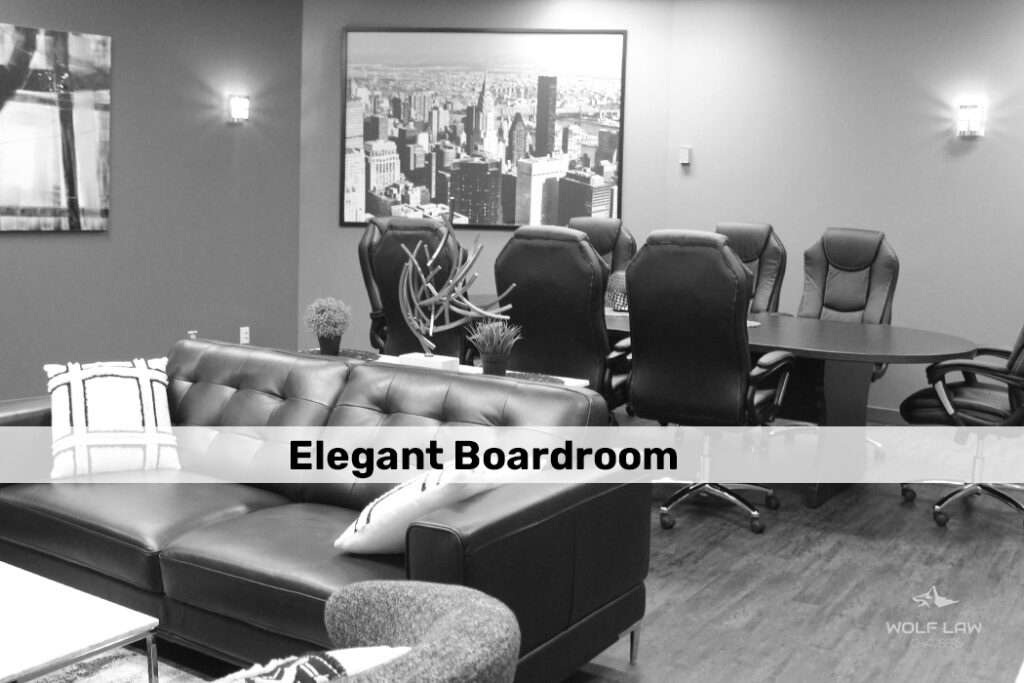

Such a spaces exist in the heart of downtown Mississauga and downtown Oakville. Welcome to Wolf Law Chambers. This workspace has virtual offices to fulfill your professional needs and requirements. The benefits of renting a virtual office space at Wolf Law Chambers include accessibility to an elegant boardroom to seat and meet with your clients, a registered mailing address, clerk office spaces to use and complete your tasks, access to mail and courier services, a readily available printer for copying/faxing/scanning, and access to a private internet network. We also have diligent and reliable process servers whose services you can use, IT support for your practice, and office coordinators always available to help. Wolf Law Chambers is the perfect office space for legal professionals looking to operate from a virtual office, but that was just the tip of the iceberg.
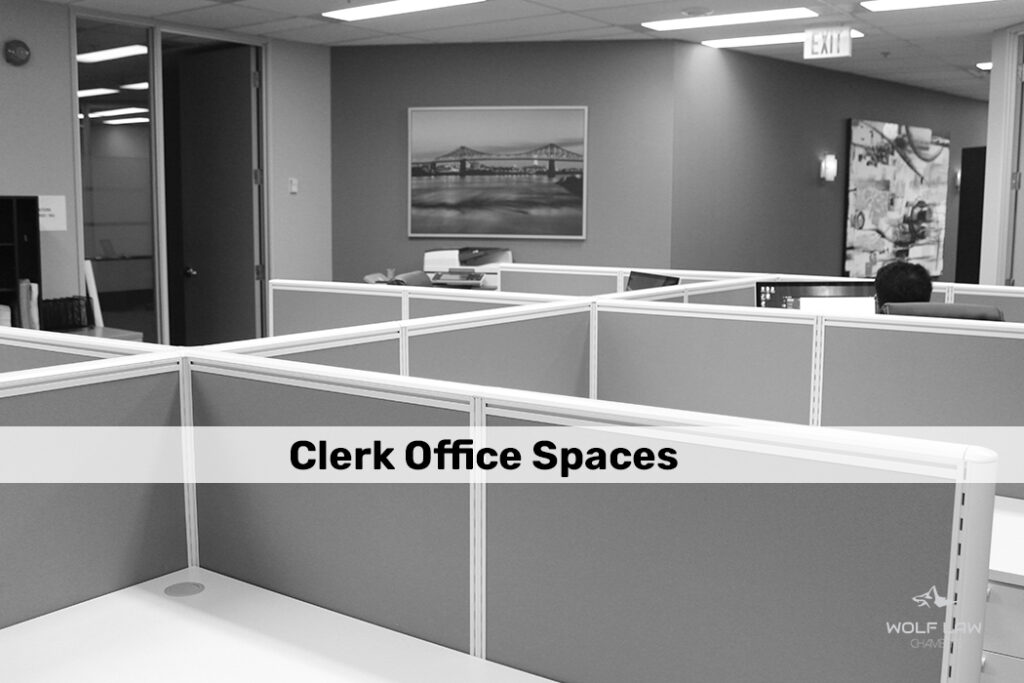

Here at Wolf Law Chambers, we aim to provide legal professionals with all the tools they need to succeed. Our goal is to build a community of legal professionals that can work together in collaboration and grow together. Although the legal professionals operate under their own professional corporations, they are able to work in collaboration on matters which encompass their areas of expertise. We have marketing and content creating specialists who are able to write and publish articles in your area of practice. We are constantly looking to promote everyone within our community. We provide the best platform we possibly can to all of our members and want to see them grow in their practice at all times. We host onsite events, seminars, and CPD workshops with some of the industry’s leading professionals. At these events we leave the floor open for anyone from Wolf Law Chambers to share their experience and expertise in their field. We aim to give all members of our chambers as much exposure as possible.
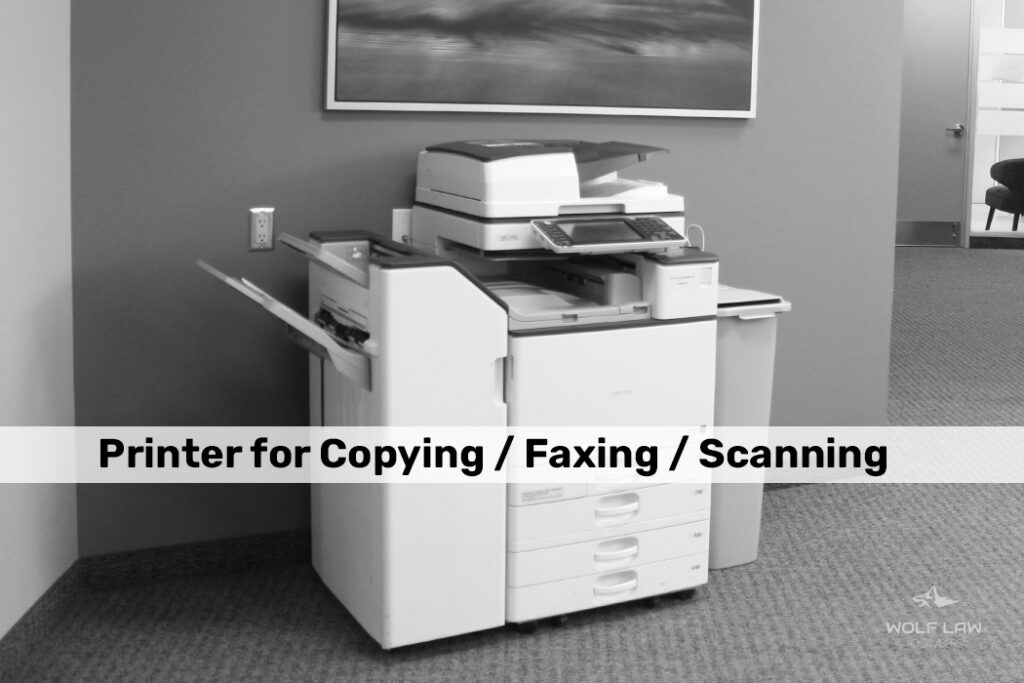

In providing extensive support and promoting your practice, we want to see you flourish in your legal practice. Come and visit Wolf Law Chambers at 90 Matheson Blvd. E. in Mississauga and 277 Lakeshore Road East in Oakville and see how we can help you build your practice and provide a sustainable platform for you to thrive in your legal career.
What makes the perfect office?
The Sole Practitioner’s Perfect Office
Today, we will be shifting our focus from law to psychology. It is no secret that where we work can shape how we work. So it is within the best interest of all sole practitioners to consider where they work. After all, if the environment around us can influence the way we work, would it not be in the best interest to put ourselves within an environment which can influence us or our work in the best possible way? This is precisely why today’s question is on what makes the perfect office for sole practitioners.
Perfection implies the fulfillment of one’s purpose and the maximization of one’s potential. The office, on the other hand, is the place that is meant for people to conduct their business and has the potential for bolstering the conduct of business. When these two definitions are amalgamated, we may better understand the meaning of the perfect office: a workspace designated for conducting business which contributes, as much as an office possibly can, to the maximization of how well business can be conducted.
So how can the quality of business processes be improved by an office? This can be answered by asking ourselves three simple sub-questions:
- Will I enjoy going to this office?
- Will my office boost my productivity?
- Will my office enhance the customer experience?
Enjoyment
Going to work can be quite difficult and exhausting when there is no enjoyment there. The challenges are exasperated further when the person going to work is solely responsible for the current and future position of their business. This is why it can be important that people enjoy what they do. Enjoyment keeps us awake. It makes us want to go to work. One of the factors that contribute to the greater enjoyment is the perfect office.
The perfect office is an office which brings us as much enjoyment as an office possibly can. This can vary depending on the person, but general psychological findings indicate that most people enjoy going to an office with a natural look. Here is an example of an office with a natural look:
These are pictures taken from the office of Wolf Law Chambers. What makes it nice to look at? One of the best explanations for this is called “soft fascination”, which is said to elevate our moods (as well as replenish our capacity for memory and creativity).
This is not to say that every sole practitioner should strive to replicate this exact office. It is to simply show how people generally gravitate towards offices with some natural lighting, plants, and a green scenery. But even if a natural look is not possible, then there is research which suggests that even reminders of nature can play a role in putting us at ease while also making it easier to connect with others. Examples include aquariums, fireplaces, plants, wooden furniture, etc. Feel free to be creative within a natural image.
Productivity
A beautiful office is worth nothing if it hinders or fails to improve productivity. An office must contribute to at least some productivity. This is where choice can play a significant role. The sole practitioners has a choice to organize their office the way they like. Research indicates that this can contribute quite effectively towards the worker’s well-being and productivity.
The technology within the office can also contribute to productivity. The test for this could simply be to observe how quickly someone can complete their tasks when they have a fast and well-structured information technology or information systems. It is almost guaranteed that the person with greater information technology and systems will be more productive than the one who has none, given that they use it properly. If used improperly, productivity may be seriously hindered. This is why even a messy desk can result in greater productivity if it is an organized mess. It is not so much about the tidiness of an office but the organizational systems which make for greater productivity.
Customer Experience
As they always say, customers come first. This is especially true for lawyers. One of the factors which can contribute to the experience of a client is their experience at the lawyer’s office. The natural look of an office can certainly help in improving the image of the lawyer. Another factor, that is not already mentioned in the enjoyment section, is the concept of curved furniture. Research indicators that people generally prefer curved furniture over sharp furniture when all is organized well.
Final Remarks
In the end, what matters most in an office is that it is enjoyable and is conducive to higher productivity and a better customer experience. It is important to make sure that going to work can be enjoyable. Otherwise, completing tasks can become more challenging than it has to be, which can affect productivity negatively. An office can also play an important role in the customer’s experience between the moment they walk in and the moment they walk out. Thus, it might help any sole practitioner to create the place where client experience is positive.
-Aaron Rajesh











